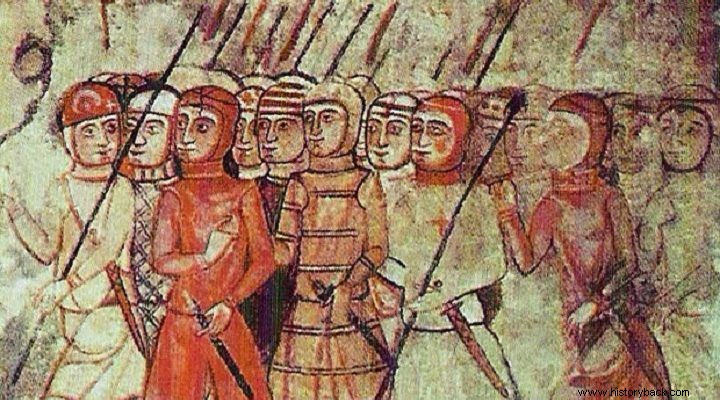
The "Catalan Company" was a body of mercenary warriors who fought in the war between the King of Aragon and the King of Sicily. When the war ended these mercenaries found themselves unemployed. Then they offered their services to the emperor Andronicus, who urgently needed troops.
In the fall of 1302 the Catalan army – 1,500 cavalry and 5,000 foot Almogavars – arrived in the City, led by Roger de Flor. Andronikos advanced 4 months' wages to the Catalans, but without immediately sending them to Asia Minor.
Staying in the City the Catalans quickly came into conflict with the Genoese also staying there and soon made a regular attack on them, slaughtering about 3,000. Andronicus made de Flore a Grand Duke and gave him his niece Maria as his wife. At the beginning of the winter of 1303 the Catalans crossed into Asia and camped at Cyzicus. There, they again came into conflict with the Alan mercenaries of the co-king Michael, killing the son of their leader.
At the same time the Turks advanced unmolested. It was not until May 1303 that the Catalans decided to move. But they soon showed their worth. In the area of Germas they destroyed a Turkish body and in Avlaki they destroyed the army of Emir Sir Ali who was besieging Philadelphia. De Flore did not continue the advance as far as the Maiander, but turning towards Lycia he scattered the forces of the Turkish emirs of Saruhan and Aydinius.
However, the Catalans, despite their successes against the Turks, did not hesitate to plunder the Byzantines as well, seizing properties and causing the displeasure of the co-king, Michael. Also, the prospect of easy plunder attracted other Catalans – 500 cavalry and 2,000 infantry – under Rocaforte and d'Entenza. Andronicus then tried to divide the Catalans, giving privileges to d Endenza.
But he did not manage to divide them. Instead, the Catalans remained united and refused to fight.
The whole year 1304 they did not move against the Turks. In early 1305 Andronikos gave an additional 30,000 gold coins to the Catalans, begging them to save Philadelphia, which was besieged by the Turks.
However, de Flore, before campaigning, went to Andrianoupolis, in April 1305, with 300 horsemen to see Michael. It is not known whether he was summoned or acted on his own initiative. There, however, he was murdered by the leader of the Alan mercenaries, George, whose son he had slaughtered in Cyzicus.
The Catalans immediately named de Endenza their leader and declared war on the empire. They even hired Turkish mercenaries, crossed into Thrace and looted everything. Michael, at the head of a heterogeneous army, attempted to intercept them at Apro in Thrace, in July 1305.
The Catalans had only 3,000 men at the time. The rest plundered the surrounding areas. Michael rushed with about 6,000 soldiers, of whom very few were Byzantine. Other sources state that Michael's army numbered 14,000 men, a figure rather excessive by the standards of the Empire at the time.
Michael commanded the native cavalry on the right, Turkish and Alan mercenaries on the left, and his untrained infantry in the center. When the army was lined up Michael ordered the Alans and Turks to attack. They attacked, but the Catalans resisted and then they turned their backs and left, while others joined the Catalans!
In this way, the left of the Byzantine army was left uncovered, a fact that the Catalans took advantage of, who moved with great boldness. Gradually, the entire Byzantine army fled, except for Michael and 100 elite horsemen. They made a desperate attack, but were fatally repulsed and Michael was wounded.
After their victory, the Catalans continued their destructive work, slaughtering, burning, dishonoring and looting everything in their path. The situation changed when general Chandrinos took over the command of the Byzantines. He pressured the Catalans and forced them to move towards southern Greece. Finally, the Catalans also defeated the Latins of the Duchy of Athens and established their own state in Boeotia.
